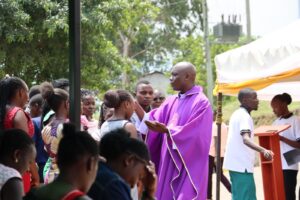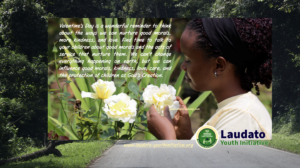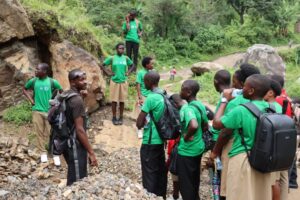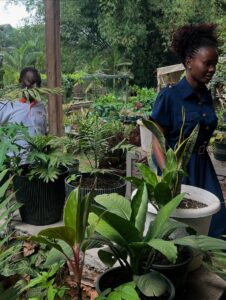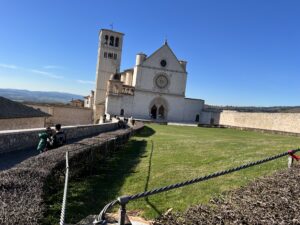By Laudato Voices | Oct 13, 2025 | Response to
The SECAM statement from the Second Africa Climate Summit is a clarion call to action. It reminds us that climate justice is not just an environmental necessity, but a moral and spiritual imperative. The youth of Africa, Uganda’s youthful population for instance presents both a significant challenge and a powerful opportunity for advancing climate action. The recent census statistics highlight that 31% of the population (14 million people) are aged 15–30, 78% of the population is under 35., so the 10.7 million youth aged 18–30, with more than half not in employment, education, or training (NEET). If well mobilized and empowered by education, faith, and a deep sense of stewardship, they have a crucial role to play in implementing these resolutions. At Laudato Youth Initiative our approach to climate solutions have been
Promoting Africa-Led Climate Solutions
Youth must embrace the responsibility of shaping Africa’s ecological future:
• In schools, our students have initiated eco- activities focused on learning and preserving indigenous environmental knowledge. Projects like our Laudato Youth Initiative One million tree Planting Drive focusing on reforestation using native species, organic gardening, or compiling oral histories of traditional ecological practices.
• In parishes and dioceses, our youth have organized “Creation Care Forums” where elders and local experts share indigenous solutions to environmental challenges.
• In communities, youth have and are busy documenting and promoting traditional farming and water conservation techniques that align with sustainable living.

Advancing Nature- and Technology-Based Approaches
Our Laudato Youth will continue to push for innovative but locally appropriate solutions:
• Our Laudato Si Clubs in schools, enaginging in agro forestry, planting Laudato Si Forrests and Gardens to integrate renewable energy demonstrations (e.g., solar-powered phone charging stations) and workshops on climate-smart agriculture.
• In parishes, and dioceses we run campaigns promoting the use of eco-friendly technologies, now encouraging the use of improved cookstoves or biogas systems, especially in rural areas also inviting church institutions to switch to solar energy.
• In communities, and Schools our Laudato youth have collaborated with local NGOs to participate “Green Innovation Challenges,” during the Laudato Si Green Festival encouraging peer-led invention of sustainable tools.
Scaling Renewable Energy is our call for all institutions to embrace
The youth must be the vanguard of Africa’s renewable energy revolution:
• In schools, initiate solar power projects, such as lighting systems or water purification setups, showcasing clean energy in action.
• In parishes, need to run more training workshops on installing and maintaining solar panels especially targeting unemployed youth and women.
• In dioceses, we need to push for investment in youth-led clean energy startups and explore diocesan-owned community energy cooperatives.
• In communities, we need to do more to create awareness campaigns about the benefits of renewable energy and the dangers of fossil fuel dependence.
Mobilizing Climate Finance with Justice remains a big challenge
However our Laudato Youth have played play a watchdog and awareness role:
• In schools and universities, organize debates and letter-writing campaigns to local leaders seeking involvement in climate finance allocations which still remains a challenge.
• In parishes and dioceses, hold forums explaining what Loss and Damage funding means, and how communities can advocate for access. Its still a question to ponder
• In communities, youth can form “Climate Justice Watch” teams to track how public and donor climate funds are being used locally.
Ensuring Adaptation and Resilience
We know that Youth-led resilience starts at the grassroots:
• In schools, we encourage water harvesting projects, permaculture gardens, and hold resilience workshops focused on climate challenges.
• In parishes, form disaster preparedness teams to support vulnerable families during climate shocks (floods, droughts).
• In dioceses, work with youth office which works in collaboration with Caritas and Catholic relief agencies to support sustainable agriculture and food security programs.
• In communities, young people can train others in climate-resilient practices like drought-resistant crops or alternative livelihoods.
Upholding the Moral Foundations and Global Solidarity
Our value in the Laudato Youth Initiative has always been Faith must fuel climate action:
• In all settings, incorporate prayer, liturgies, and spiritual reflections that emphasize care for creation (inspired by Laudato Si’ and Laudate Deum).
• Laudato Youth choirs and art groups create songs, drama, and murals on climate justice to awaken hearts and minds.
• Our Laudato Youth delegations represent communities at local, national, and international climate dialogues, calling for ethical action and ecological justice.

The Laudato Youth Initiative deeply appreciates the bold and prophetic voice of SECAM in the 2025 Africa Climate Summit. This statement resonates with our mission and strengthens our resolve. It offers not only a framework but a moral mandate rooted in the African interpretation of Laudato Si’ and Laudate Deum that we have always stood for to act with urgency, creativity, culture and values. We are particularly inspired by the call to ecological conversion, renewable energy, and youth empowerment. The emphasis on Africa-led, community-rooted climate solutions echoes our own commitment to local action with global impact.
As young people across schools, parishes, dioceses, and communities, we rise to this challenge with open hearts and active hands. We will plant, protect, educate, innovate, and advocate because the future of our common home begins with what we do now. Together, with the Spirit as our guide, and the Earth as our shared responsibility, we pledge to turn resolutions into reality at the Laudato Youth Initiative









